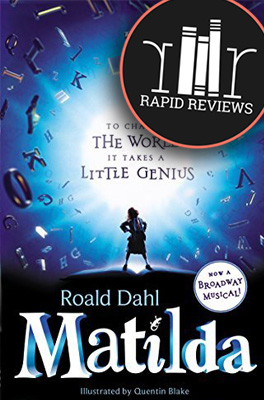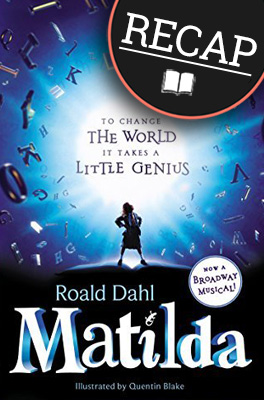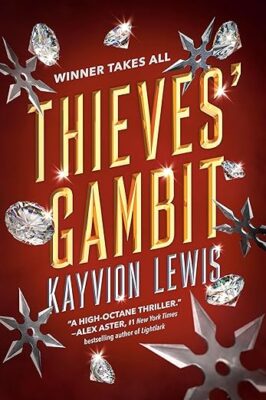No spoilers in this review of the Matilda by Roald Dahl.
Special thanks to Sarina Byron, a BSR contributor who wrote this great review! Sarina is a British Author and Contributing Writer living in California. Sarina enjoys bringing forth a different perspective and encouraging a different way of thinking through her writing. Visit her blog to read her reviews, and check the end of the review for a link to her Instagram.
Matilda Wormwood has long fascinated us. Since our first introduction to her in 1988, we have been trying to understand Matilda in multiple ways. Whether by way of the Danny DeVito-directed movie or the Netflix musical, this five-year-old continues to fascinate us for over four decades. One might ask, what makes her special?
Is it that she can read Dickens and speak with an adult-level vocabulary? Or is it that she has the smarts to punish her neglectful, ignorant, and cruel parents? When I think about Matilda, this is the question that haunts me—What makes Matilda special?
Keeping her face to the sun
No matter the state of her home or school, Matilda is always cheerful. She was raised within a family that barely bothered to tend to her needs. She learnt to feed and dress herself when she was two years old. No one bothered to teach her the alphabet, and yet she learnt to read. Her determination brought her to the library where she continued to further her education. When she joins Crunchem Hall, her bright future is clouded over by the terrifying Headmistress, Miss Trunchbull.
Despite all these drawbacks, she finds a way to stay cheerful. Her spirit is undefeated in the face of numerous setbacks. Her hindrances are placed by the very people who are meant to help her. Nevertheless, at no point does one see Matilda despair. Even at five years old, she knows that she alone is enough, and there is always a way. Something about her “keep your face to the sun” attitude makes our heart go out to her. Perhaps we’ll never know if we could have been as strong as Matilda when we were children. But she fortifies our confidence in the strength of the young. In her own words . . .
“Children are not so serious as grown-ups and they love to laugh.”
Never suffering bullies
Matilda’s father makes a minor linguistic error. He tells her, “When a person is bad, that person has to be taught a lesson.” As the masterful Roald Dahl points out, when Mr. Wormwood used person instead of child, he taught Matilda a valuable lesson—punishments are not limited to children. Matilda makes a connection. So far, she understood bullying behavior as incorrect, but now she feels empowers to punish them.
Deeply insightful, she is instantly able to identify unfair treatment. She can follow the lane of logic, spotting any deviations or roadblocks placed by bullies. Amongst her other enduring legacies, this one jumps out the most. Roald Dahl enriches her character with his dislike for bullies. Using the example of the most innocent creature he can think of, he teaches us to speak up for ourselves, like when Matilda tells The Trunchbull she has indeed read Nicholas Nickleby. Why should someone else feel entitled to wipe out her achievements? Another instance Matilda takes charge is the time she mixes peroxide in her father’s hair oil to punish him for destroying her library book.
Matilda’s perspective impacts more people than she intends to. Miss Honey had never spoken of her miserable existence until she meets this gifted child. She isn’t fighting fit yet, but she is strong enough to confront how she feels. In Miss Honey’s own words:
“You can’t imagine what it’s like to be completely controlled by a very strong personality. It turns you to jelly.”
Take it from Miss Honey: Never allow anyone to turn you to jelly, no matter who they are.
Going the whole haul
When Lavender wonders aloud how The Trunchbull got away with her atrocious behavior, Matilda’s answer drips with deep insight.
“Never do anything by halves if you want to get away with it. Be outrageous. Go the whole hog. Make sure everything you do is completely crazy, it’s unbelievable.”
A perfect assessment of the Headmistress’s attitude, this statement is also a fantastic decree to live by. Matilda understands that the more outrageous you are, the more unbelievable your actions appear to people, increasing your chances of success. Perhaps we could all live like that. So many of us would rather give up on our dreams than be ridiculous. Maybe trading in reason and logic for over the top and absurd will deliver us from being disappointed in ourselves.
Even in denouncing a great terror, Matilda gives us something valuable.
Going forward is paramount
The thing about life is, as much as we love to look back, we have to keep moving forward. However, we almost always forget that. Looking back is tempting because it makes sense as we neatly arrange things in the order they occurred and insert lessons we learnt. Life though, is not lived in retrospect; it is always lived forward.
“The whole object of life Headmistress is to go forward”
Roald Dahl delivers this fantastic life insight via Miss Honey, reminding us of the power of great writing. What makes books relatable is not perfect grammar or prose-filled sentences but the ability to connect. Roald Dahl has masterfully built the characters and chapters to deliver sagacious lessons. Matilda’s story does so in every chapter, thereby touching our hearts more often than we are prepared for. After all, a book has a larger purpose than the story.
As I closed Matilda and reflected on what I would include in my review, several simple lessons stood out. There is plenty of expert storytelling and character building to reflect upon, but what we really take away is the relatable parts. Children’s books are often overlooked, but the truth is, the well-written ones connect the most with adults. You see, they’re built to deliver important life lessons in the simplest way possible. Maybe we can all do with a reminder from our early years, or perhaps we can leave the job to Matilda!
Let us know what you think about Matilda and Sarina’s great review in the comments! No spoilers on this page, please!
Ready to read Matilda? Click to buy and help us pay for hosting.

What now?
Don’t forget to check out Sarina’s blog, and you can follow her on Instagram!
Follow Book Series Recaps on Instagram, Pinterest, and Twitter.
Friend us on Goodreads: Sara and Stacy.
Oh and share this review of Matilda with your friends who might like this book!





















